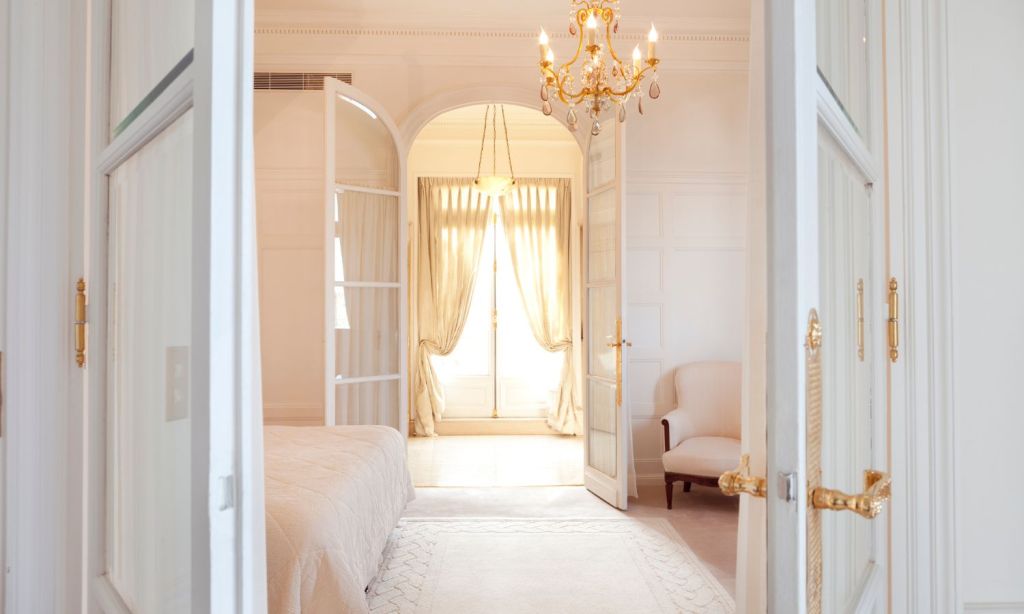Neale Whitaker knows interiors. He’s been in the business of it since the 1980s, most recently helping to design a suite, Suite 303 by Neale Whitaker, for the newly-renovated Melbourne boutique hotel Laneways by Ovolo.
Whitaker says he added to the existing space more ambience and individuality, with the help of original artwork and home décor by local artists, and that that’s a tip you to do can do to add more character to your bedroom at home.
Ahead, Whitaker shares six other tips you can do that’ll lend themselves to making your bedroom feel like a hotel suite.
Invest in Luxury Bedding
When you consider that we all spend roughly one-third of our lives sleeping, it’s more than justifiable to opt for the best of everything in the bedroom, and that includes the bed linen, says Whitaker.
“The more comfortable and luxurious the bedding, the better you are likely to sleep,” he says. “And the better you sleep, the better you’ll feel. It’s as simple as that.”
Buy Blockout Curtains
Next up is the curtain situation. Whitaker says hotel bedrooms place a great deal of emphasis on light control — both natural and artificial — because light levels impact the quality of your sleep. Personally, he doesn’t think we should settle for less at home.
“A good blockout curtain is essential, especially if you live in an urban area with bright street lighting, but so are soft, light-filtering window furnishings for daytime rest, particularly in summer,” he says. “My preference is for the combination you’re likely to find in modern hotels: automated blinds combined with sheer curtains. Not only are they functional, but they look terrific, too.”
Consider the Lighting
Lighting is everything — at least Whitaker believe it is. In his eyes, the ambience of a room is created as much by lighting as it is by furnishings.
“How often have you stayed in a hotel room — and luxury hotels are no less guilty of this — and thought ‘Where are the lamps?’ It often seems as if no thought is given to how a room will feel at night. The same rules apply at home.”
Downlights are great for tasks like cleaning and making the bed, but they aren’t ideal to sit under at night, he says. Instead, he says to add bedside lamps on either side of the bed for reading and at least one other table lamp, on a chest of drawers or sideboard, or floor lamp for ambience. Candles can be great in winter, too.
Focus on Statement Furniture and Home Décor
Statement pieces create impact and visual balance. The bed and wardrobe — whether walk-in, built-in or free-standing — are generally going to be the functional, focal points in a bedroom, he says. But a few statement pieces — depending on the size of the bedroom that might be art, mirrors, pendant lamps, chairs or other items of furniture – will add mood and character.
“In a small bedroom think about large wall-mounted or free-standing mirrors to dramatically increase the feeling of space,” he says.
Clear the Space Around Your Bed
While Whitaker says it’s not necessary to keep the whole of your bedroom floor empty, though it is well-known that clutter isn’t conducive to rest and relaxation, he does say it’s best to ensure the space around your bed, open drawers and wardrobes is clear.
“I recently stayed in a luxury hotel where the end of the bed was so close to the wall it made the passage from one side of the bedroom to the other quite difficult,” he says. “Be realistic about the proportions of your bedroom when you’re choosing between a double, queen or king-size bed and if space is at a premium, consider some of the bed options with built-in storage.”
Add Your Own Distinct Personality
Finally, Whitaker suggests you add your own distinct personality to your bedroom, with the only rule being: there are no rules.
“What you choose to display in your bedroom is really only limited by space, budget — and your imagination,” he says. “I’m a firm believer that the mood of a bedroom, whether in a hotel or at home, is created by lighting and the inclusion of art, books, rugs, mirrors, bedlinen and soft furnishings.”
He says you’ll find all of those items in his bedroom at home. From a functional perspective, successful bedrooms need comfortable beds, wardrobe and storage options, mood and task lighting, soundproofing, which rugs and carpets can help with, and – ideally — ensuite bathrooms.
“The personality, though, comes from your styling choice,” he says. “Bedrooms should fundamentally be calm, restful spaces, but there’s an increasing demand for TVs, study nooks and sound docks, too.”
Related: Extend the Life of Your Linen Bedding With These 6 Expert Tips
Related: This Corduroy Bedding Is the Secret to a Quality Sleep In Icy Cold Months
Read more stories from The Latch and subscribe to our email newsletter.







